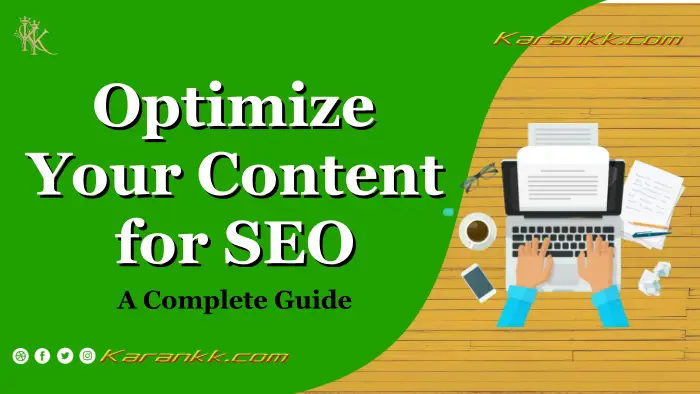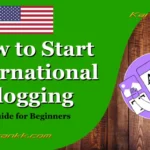In today’s digital world, content is king. The quality of your content determines your success in online marketing, and optimizing your content for search engines is crucial.
Search Engine Optimization (SEO) helps your content rank higher in search engine results pages (SERPs) and increase your website’s visibility.
In this article, We’ll go through strategies for increasing traffic and conversions as well as how to optimize content for search engines.
Understanding SEO
Before we dive into the optimization process, let’s first define what SEO is. SEO is the practice of improving the quality and quantity of traffic to your website from search engines.
The goal of SEO is to increase your website’s visibility in organic search engine results pages (SERPs).
Search engines use complex algorithms to determine which websites rank higher based on various factors, including content quality, relevance, user experience, and backlinks.
Conducting Keyword Research
Keyword research is the first and most crucial step in optimizing your content for SEO.
Keyword research involves identifying the words and phrases that people search for to find information related to their niche.
Use tools like Google Keyword Planner or SEMrush to research and find relevant keywords for your content.
Consider the search volume, competition, and relevance of each keyword when selecting them.
Creating High-Quality Content
Creating high-quality content is essential in optimizing your content for SEO. Your writing needs to be engaging, instructive, and relevant to your audience.
Use relevant keywords throughout your content, but avoid stuffing them, as this can hurt your rankings.
Ensure your content is well-structured with headings, subheadings, and bullet points to improve readability and user experience.
Also, use images and videos to make your content more engaging.
Optimizing Your Content for On-Page SEO
On-page SEO refers to optimizing your content and website for search engines. Some essential on-page SEO factors to consider include:
Title Tags
Title tags are crucial for on-page SEO. Your title tag should include your primary keyword and be concise and descriptive. The ideal length for title tags is 50-60 characters.
Meta Descriptions
Meta descriptions are short snippets that describe your page’s content. Your meta description should be informative, and relevant, and include your primary keyword. The ideal length for meta descriptions is 155-160 characters.
Headers
Headers are important for on-page SEO as they help search engines understand the structure of your content. Use H1 tags for your main headings and H2, H3, and H4 tags for subheadings.
URLs
Your URL should be descriptive and include your primary keyword. Avoid using lengthy URLs with unnecessary parameters.
Internal Linking
Internal linking is linking your content to other pages on your website. This helps improve your website’s structure and user experience. Ensure your internal links are relevant and useful to your readers.
Building High-Quality Backlinks
Backlinks are links from other websites that point to your website. High-quality backlinks can significantly improve your website’s authority and rankings in search engines.
To build high-quality backlinks, create informative and engaging content that people would want to link to.
You can also reach out to other websites in your niche and request a backlink.
Measuring and Analyzing Your SEO Performance
Measuring and analyzing your SEO performance is crucial in improving your rankings and traffic.
Track the performance of your website, including traffic, bounce rate, and user behavior, using tools like Google Analytics or SEMrush.
Analyze your data and make necessary adjustments to your content and SEO strategy.
Conclusion
It takes time and effort to continuously optimize your content for search engines. You can boost your website’s access and ranks by using the advice and suggestions in this article.
You may increase the ranking and ranks of your website, which will ultimately result in increased traffic and conversions, by using the advice and techniques in this article.
Keep in mind that you need to focus on producing high-quality, interesting content that has improved both user experience and search engine ranking.
Start a Blog and Make Money Online ( Free Full Guide )
- How to Start a Blog
- How to Choose a Niche
- How to Choose a Blogging Platform
- How to Choose the Perfect Domain Name
- How to Choose a Domain Name for a Personal Website
- How to Sign Up with Hostinger
- How to install WordPress in Hostinger
- How to Install GeneratePress Premium
- How to Install Essential Plugins
- Best Keyword Research Tool
- Create High-Quality and Engaging Content
- How to Optimize Your Content for SEO
- How to Monetize Your Blog
- How to Promote Your Blog
FAQs
Why is SEO important for content marketing?
SEO helps your content rank higher in search engine results pages, increasing your website’s visibility, and driving more traffic and conversions.
What is keyword research?
Keyword research involves identifying the words and phrases that people search for to find information related to their niche. This helps you create content that is relevant and optimized for search engines.
How do I optimize my content for on-page SEO?
Optimizing your content for on-page SEO involves optimizing your title tags, meta descriptions, headers, URLs, and internal linking.
What are backlinks?
Backlinks are links from other websites that point to your website. High-quality backlinks can significantly improve your website’s authority and rankings in search engines.
How do I measure my SEO performance?
Track the performance of your website, including traffic, bounce rate, and user behavior, using tools like Google Analytics or SEMrush. Analyze your data and make necessary adjustments to your content and SEO strategy.






